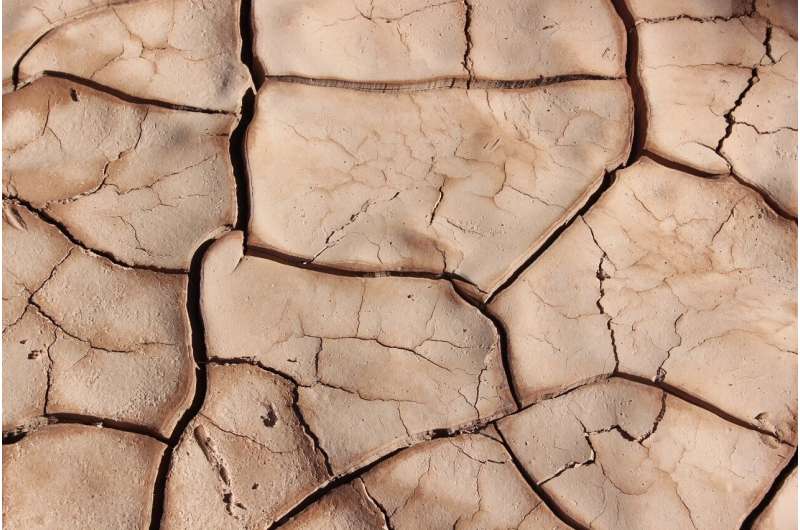Major water cutbacks loom as shrinking Colorado River nears 'moment of reckoning'

As the West endures another year of unrelenting drought worsened by climate change, the Colorado River's reservoirs have declined so low that major water cuts will be necessary next year to reduce risks of supplies reaching perilously low levels, a top federal water official said Tuesday.
Bureau of Reclamation Commissioner Camille Calimlim Touton said during a Senate hearing in Washington that federal officials now believe protecting "critical levels" at the country's largest reservoirs—Lake Mead and Lake Powell—will require much larger reductions in water deliveries.
"A warmer, drier West is what we are seeing today," Touton told the Senate Energy and Natural Resources Committee. "And the challenges we are seeing today are unlike anything we have seen in our history."
The needed cuts, she said, amount to between 2 million acre-feet and 4 million acre-feet next year.
For comparison, California is entitled to 4.4 million acre-feet of Colorado River water per year, while Arizona's allotment is 2.8 million acre-feet.
The push for a new emergency deal to cope with the Colorado River's shrinking flow comes just seven months after officials from California, Arizona and Nevada signed an agreement to take significantly less water out of Lake Mead, and six weeks after the federal government announced it is holding back a large quantity of water in Lake Powell to reduce risks of the reservoir dropping to a point where Glen Canyon Dam would no longer generate electricity.
Despite those efforts and a previous deal among the states to share in the shortages, the two reservoirs stand at or near record-low levels. Lake Mead near Las Vegas has dropped to 28% of its full capacity, while Lake Powell on the Utah-Arizona border is now just 27% full.
Touton said it's critical to achieve the additional cutbacks and her agency is in talks with the seven states that depend on the river to develop a plan for the reductions in the next 60 days. She warned that the Bureau of Reclamation has the authority "act unilaterally to protect the system, and we will protect the system."
Though Touton didn't spell out what that could entail, the Interior Department could impose cuts if the states fail to reach an agreement on their own. Touton said her agency is "working with the states and tribes in having this discussion."
"We need to see the work. We need to see the action," Touton said, calling for representatives of the states "to stay at the table until the job is done."
The Colorado River supplies water to nearly 40 million people in cities from Denver to Los Angeles and farmlands from the Rocky Mountains to the U.S.-Mexico border. The river has long been over-allocated, and its reservoirs have declined dramatically since 2000 during a severe drought that research shows is being intensified by global warming and that some scientists describe as the long-term "aridification" of the Southwest.
"What has been a slow-motion train wreck for 20 years is accelerating, and the moment of reckoning is near," said John Entsminger, general manager of the Southern Nevada Water Authority, which supplies the Las Vegas area.
He pointed out that Lake Mead's water level, now at 1,045 feet above sea level, has continued to decline toward critically low levels. Hoover Dam could still release water down to a level of 895 feet, but below that, water would no longer pass through the dam to supply California, Arizona and Mexico—a level known as "dead pool."
"We are 150 feet from 25 million Americans losing access to the Colorado River, and the rate of decline is accelerating," Entsminger told the senators.
Avoiding "potentially catastrophic conditions," Entsminger said, will require reductions in use that many water managers previously considered unattainable.
In talking with representatives of other states, Entsminger said, they all recognize the urgency of the situation and are working to increase conservation efforts.
"However, and there's no way around this, cities alone cannot address this crisis," Entsminger said.
Entsminger pointed out that roughly 80% of the river's flow is used for agriculture, and most of that for thirsty crops like alfalfa, which is mainly grown for livestock, both in the U.S. and overseas.
"I'm not suggesting that farmers stop farming, but rather that they carefully consider crop selection and make the investments needed to optimize irrigation efficiency," Entsminger said. "By reducing their use of Colorado River water, agricultural entities are protecting their own interests."
Last year, the federal government declared a shortage on the Colorado River for the first time, triggering substantial cutbacks in water deliveries to Arizona, Nevada and Mexico. Farmers in parts of Arizona have left some fields dry and unplanted, and have turned to more groundwater pumping.
The cuts have yet to limit water supplies for Southern California, but that could change as the reservoirs continue to drop.
The timeline that Touton laid out, to come up with an agreement for water reductions within 60 days, puts the deadline just before the Bureau of Reclamation is scheduled to release its mid-August projections for reservoir levels on the river. Those projections determine the level of the shortage in 2023 and the severity of the required cuts in water deliveries.
"Let's get to the table, and let's figure this out by August," Touton said. "That's what we're working towards."
2022 Los Angeles Times.
Distributed by Tribune Content Agency, LLC.




















